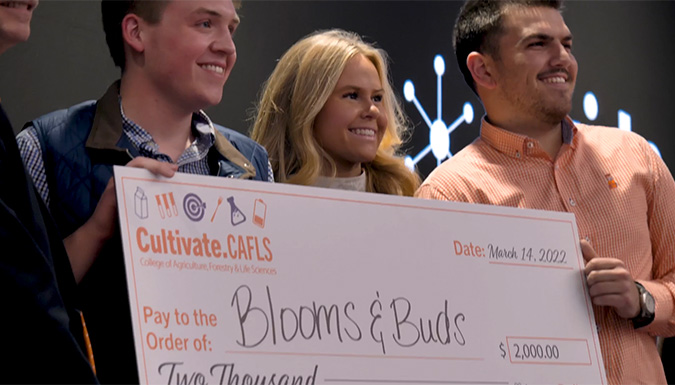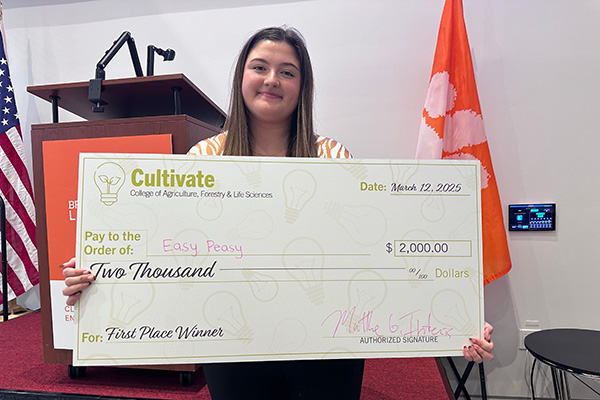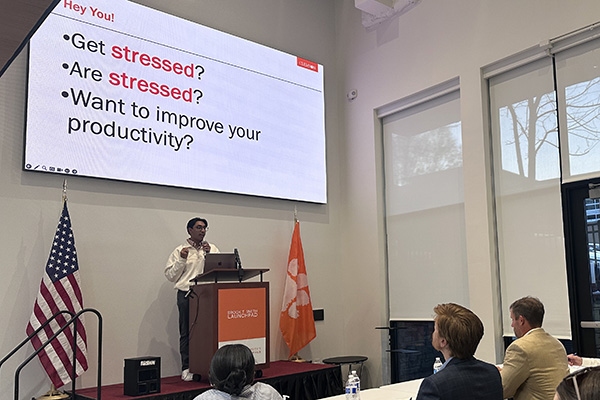CAFLS Student Startups
Cultivate
Cultivate is an entrepreneurial program that aims to encourage Clemson students to develop ideas and explore innovative solutions to cultivate a unique business proposition. Students from the university’s College of Agriculture, Forestry and Life Sciences compete for prizes to help bring their business plan to life.

Winners
The culminating event of Cultivate is the Cultivate Pitch Competition where students pitch their business ideas to a panel of entrepreneurial experts.
1st Place & Audience Favorite
Easy Peasy
Team Member
Mackenzie Kelley (Packaging Science)

Easy Peasy provides novel and open-source accessibility tools to make everyday activities easier.
2nd Place
Toasted Sugar
Team Member
Catherine Valente (Food, Nutrition & Culinary Science)
Janet Lopez-Sanchez (Food Science & Technology)

Toasted Sugar is a unique confectionary product that reduces the calories and improves the taste of traditional sugar.
3rd Place
The Pom Box
Team Member
Shayar Joshi (Packaging Science)

The Pom Box combines sophistication and time-tested methods to convert cavings into productivity.
2023-2024
-
1st Place & Audience Favorite, Checkerz Gluten-Free Baking Co.
Checkerz Gluten-Free Baking Co.
$2,000
Team Members
Deb Hutchins, Food, Nutrition, & Packaging Science
Merritt Meeks, Packaging ScienceImagine, birthdays without cupcakes, Thanksgiving without pie, Christmas without cookies, or weddings without cakes. This is the reality for the approximately 2 million Americans with celiac disease who cannot consume a crumb containing wheat, barely, or rye without short and long-term, significant adverse health effects. There are countless items that surprisingly contain wheat, therefore gluten-avoiding consumers must constantly check the ingredients for everything they eat. While some store-bought gluten-free options are available, they often lack balanced nutritional value and freshness.
Checkerz is here to provide home-baked, gluten-free goods, already ingredient checked, for people in Clemson, the Tri-county area, and beyond. We bake both sweet and savory items like: cookies, cakes, biscuits, tortillas, cinnamon rolls, protein bars, muffins, donuts, and more. Find them on instagram @glutenfreecheckerz to coordinate orders and enjoy baked goods with confidence!
-
1st Place, Swirly Sudz
Swirly Sudz
$1,500
Team Member
Ryan Barber, Packaging ScienceIn the consumer body soap market, there is a clear divide between liquid body wash and bar soap. Liquid body wash capitalizes on a convenience-based market, while bar soap targets the allergen-concerned consumer. Swirly Sudz caters to both of these markets by offering a new and unique way to use irritation and allergen-free bar soap.
Thanks to a unique package design of a PET rigid twist dispenser and a high coefficient of friction label, Swirly Sudz allows consumers to grip bar soap with ease, prevents soap from falling off and sticking to the shower shelf, and provides consumers an easily traveled with bar soap–mess-free. This package design is particularly helpful for consumers with motor limitations such as arthritis or Parkinson's disease and has been arthritis tested and approved!
-
3rd Place, Pocketfuel
Pocketfuel
$500
Team Member
Tionna Lipscomb, Packaging ScienceDid you know that it takes pistachio shells three years of environmental exposure to become biodegradable? Additionally, traditional pistachio packaging is made completely of plastic with nowhere to put empty shells, forcing consumers to dig through a pouch of eaten and uneaten pistachios alike. Enter PocketFuel. PocketFuel features a 100% recyclable corrugate box with an adjustable divider to separate your empty shells from the rest of your pistachios. This portable product encourages a “leave no trace policy” by offering a place for empty shells. In addition, PocketFuel helps eliminate clean up time and is an environmentally friendly and portable treat!
December 2022
-
1st Place, Hinson Family Farms
Hinson Family Farms
$2,000 - Agricultural Sciences
Team Member
Kinlyn Hinson, Agricultural EducationHinson Family Farms is a six-generation grit farm operation. Grown, packaged, and shipped directly from the family farm, Hinson Family Farms aims to bridge the gap between agriculture education and the general public. As of 2022, Hinson Family Farms has sold 180,000 units and intends to utilize the opportunity Cultivate.CAFLS provides in order to purchase a travel trailer. With this trailer, the operation can become mobile and demonstrate what agriculture truly is to consumers everywhere. After all, without agriculture, where would we be?
-
2nd Place, Voney
Voney
$1,500 - Food, Nutrition and Packaging Science
Team Member
Javin Goodine, Food, Nutrition and Culinary Sciences
Brennan Lytle, Packaging Science
Luke Watrous, Packaging Science
Remy Schimick, Packaging Science
Emmery Sayers, Packaging Science
Brysen Nelson, Packaging ScienceHoney is one of the most versatile foods in the world. It is found in more places than just a plastic bear jar on a shelf. It is used in everything from breads, cured meats, cereal, condiments, pharmaceuticals and even skincare products. The annual consumption of honey is constantly increasing in the US, creating a demand too difficult for beekeepers to manage. As a result, the majority of honey is imported and adulterated, providing a product of lesser quality to consumers.
Additionally, veganism is on the rise. With a plethora of vegan alternatives for just about everything, honey is one product that has not been expanded upon. Look no further than Voney–a plant based alternative to honey made from apples, tea and sugar. Not only is it a healthier alternative thanks to antioxidants, it has a similar appearance and flavor profile to honey, meaning consumers receive all of the delicious taste and none of the adulteration!
-
3rd Place, Upgrain
Upgrain
$1,000 - Food, Nutrition and Packaging Science
Team Member
Toni Sharp, Food, Nutrition and Packaging Science
Sara Abbett Kirven, Packaging Science
DeAundre Cooley, Packaging Science
Kirsty McLaren, Packaging Science
Emily Stacy, Packaging ScienceMany meal bars on grocery shelves have a negative environmental impact, be it non-recyclable or compostable metallized films or inefficient use of remaining ingredients. The smaller decision of purchasing an unsustainable meal bar plays into the larger global issue of around $1 trillion dollars worth of food waste and 10 million tons of plastic packaging landfilled in the US each year.
This is where Upgrain comes in. Upgrain is a delicious oat-based bar made with upcycled barley, also known as “spent grains.” Spent grains are the high fiber, high protein barley leftover after beer making that are then dried and ground into a flavorless powder. In addition, Upgrain meal bars use curbside recyclable packaging. This bar helps divert plastic pollution from landfills and eliminate food waste, creating a closed loop, sustainable food system. Upgrain is a bar that consumers can feel good about knowing snacking never did so much good!
-
Audience Favorite, Recheesable
Recheeseable
$500 - Food, Nutrition and Packaging Science
Team Member
Deb Hutchins, Food, Nutrition and Packaging Science
Riley DeKrafft, Graphic Communications
Copeland Reed, Packaging Science
Clare Sumners, Packaging Science
Sarah Dumont, Packaging ScienceWhen it comes to blocks of cheese, consumers are looking for resealable cheese packaging that easily opens and closes, while maintaining the freshness of the cheese within. Enter Recheesable: Specialized plastic cheese packaging with an easy-tear, air-tight seal prior to opening and an even easier to use reusable adhesive closure. Not only does this packaging technology eliminate the need for a zip-top plastic bag, it also maintains the correct conditions for prolonged storage. Ditch the extra bag so we can all say “Cheeeese!”
March 2022
-
1st Place, Blooms & Buds
Blooms and Buds
Team Members
Mark Burns, Horticulture
Abigail Gibson, Ag Business
Weston Whitfield, Packaging ScienceThe floriculture industry has been a thriving segment of agribusiness across the globe with the advent of Floral Shops and services at the beginning of the industrial age in the late 1800s. A recent study by the Greenhouse Industry indicates that Gen Y consumers are significantly less likely to have a high appreciation of flowers, give flowers as gifts, and differentiate florists from other gift retailers and/or purchase mixed flowers. This data suggests that for floral businesses to expand their market share to younger populations, an effort to market flower purchases have meaning beyond the plant purchase is a possible method to attract younger consumers to become loyal floral customers. This project will explore a marketing approach that capitalizes on the concept of a sustainable and environmental beneficial plant and package to entice young consumers to give sustainable blooms and buds. This will be done in the production process of flowers and sustainable recyclable packaging to ship or share the flower purchase.
-
2nd Place, Biopack Kudzu Plastic
Biopack Kudzu Plastic
Team Members
Sneh Bangar, Food, Nutrition & Packaging Sciences
Cayden Gates Food, Nutrition & Packaging SciencesIn the past few decades, the production and application of plastic have escalated due to wide availability, cost-effectiveness, and excellent mechanical properties. However, plastic waste is low biodegradable and significantly contributes to environment pollution. Due to the highest consumption of plastic, packaging industries have become the primary source of plastic waste accumulation at an alarming rate. Therefore, there is an urgency to introduce environment-friendly packaging materials that are durable and cost-effective.
Natural polymers have been explored as potential alternatives to conventional packaging material. Among biopolymers, starch stands out as the future green biopolymer because of its abundant availability, renewability, eco-friendliness, and degree of functionality. However, poor processibility, restricted tensile strength, and high-water absorption capacity of starch films limit their practical applications. Recent research has shown that chemical modifications of starch and reinforcement with other polymers can improve the mechanical, thermal, and barrier properties of starch films. Cellulose nanocrystals (CNCs) extracted from plant tissues have shown promise to improve properties of natural polymers by improving crystallinity, mechanical strength, surface area, and active binding sites.
Kudzu is an invasive weed which has aggressively invaded over three million hectares in US. Kudzu is extremely bad for the ecosystems and infrastructure, including shading out native vegetation, altering soil chemistry, decreasing native biodiversity, and destroying power lines/ structures. It would be beneficial if kudzu is utilized to extract CNCs to reinforce starch-based films.
Therefore, developing starch-based films ovide commercial use of invasive weed but also offer a sustainable option for packaging industry.
-
3rd Place, Kerby's Kritters
Kerby’s Kritters
Team Member
Julia Kerber, Animal and Veterinary Sciences with a concentration in AgribusinessI plan to advance my entrepreneurial project Kerby's Kritters. Kerby's Kritters is a pet boarding, grooming, and daycare service that will be located in South Carolina. We will specialize in dogs but welcome other household pets to board when owners are away on vacation. Daycare services will be offered on weekdays for dogs to socialize and exercise while owners are working or running errands. The dogs will be allowed to play in groups to enhance their social skills and playtime activities. We will offer grooming services with a certified groomer and boarding all year long for a variety of household pets. When boarding, there will be a variety of addons that owners can purchase to make each pet's stay memorable and enjoyable. There will also be a small store upfront with pet essentials and cute gifts for sale. Overall, I want to create a fun and safe experience for pets at a country styled kennel run by passionate and experienced staff. Kerby's Kritters will give pets time to socialize and exercise while at daycare and boarding, a secure and comfortable area at night, and beautifying makeovers in grooming.

